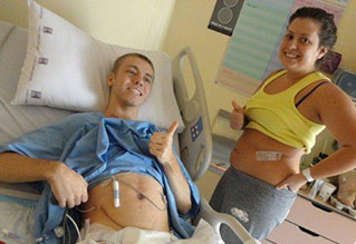
Checking the safety of the living donor organ
All living donors go through a range of medical tests to check their general health and liver and see if they have any viruses or chronic (long-term) infections, including HIV, hepatitis, any sexually transmitted infections or West Nile virus.
The blood work that is needed for these tests takes place when the donor is first assessed and again within 30 days of the transplant surgery.
You can find out more about how living donors are evaluated from the University Health Network.
Organizing the transplant
Once the living donor's medical team confirms that the donor is suitable to donate part of their liver to you, your transplant nurse will arrange a surgery date.
In some transplant programs, you and your donor will be admitted to the same hospital. In others, you may be admitted to a children's hospital while your donor is admitted to a hosptial for adults.
If you and your donor are in different hospitals, the transplant program will arrange how to transport the portion of their liver from one hospital to the other as quickly and safely as possible.
Further tests that you may need before living donor transplant
You may need a few extra trests before receiving a living donor transplant. This may include a CT scan so that the surgeons can plan your surgery. Your transplant nurse will arrange this test if you need it.






